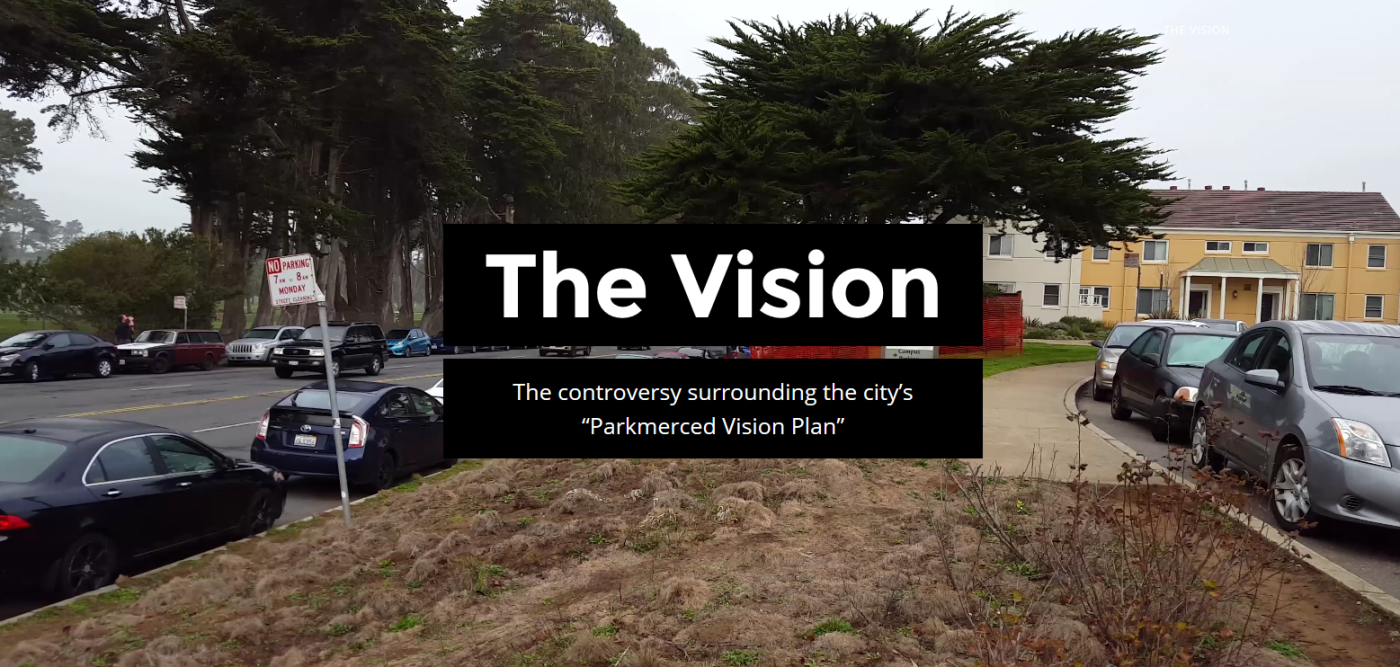Click here for the media segment
After years of controversy, the city and private contractors are going to begin a new project to construct houses and other structures in the Parkmerced area.
The Parkmerced vision plan is a 30 year project to revitalize a 152 acre area in the Lake Merced District, that contains housing units, apartment buildings and public land. The project was first approved in 2011, and includes multiple plans aimed at improving the surrounding area. The plan will provide over 5,000 new housing units, new forms of public transportation and develop an “ecologically sustainable neighborhood.”
The project is separated into phases that will be approved separately by the board once the previous one has been completed. The first phase will have 1,600 new units built next year.
“because of the particular location of this project, I think it’s entirely likely, although it’s some speculation on my part, that the [units] here will be priced at points that are much more accessible to the middle class of San Francisco,” said Michael Theriault, the secretary treasurer for the San Francisco Building and Trades Council. “Thank goodness we’re finally talking about housing on the westside of town.”
City planners held community meetings to educate residents on what the plan meant for them, and how it would impact their neighborhood.
Due to a legal battle, between residents and the city, the project was put on hold until October 2015. The Parkmerced Action Coalition argued that the city had not properly conducted its initial environmental impact reports, and that the plan might not be beneficial for low income residents in the area. However, the case was closed in favor of the city and the contractors, and the project is officially moving forward.
Susan Suval, vice president of the Parkmerced Action Coalition, has been trying to organize the community around Parkmerced to stop the development. “They held all these meetings, but in the end they just did what they wanted,” said Suval. “They just disregarded the community input altogether.”
“We’re very concerned, these people don’t operate with integrity,” said Cathy Lentz, a resident of Parkmerced and a member of the Parkmerced Action Coalition. “They’ve lied about this since day one.”
Lentz claims that representatives of the project have even broken laws in an attempt to get the lawsuit dropped.
“We had two years of meetings, and then they just unfolded this whole thing about demolition which they never told us about,” said Lentz. “They also asked us to turn over our member list, which is blatantly against the law.”
The Parkmerced Vision Plan also involves removing over a hundred trees from the area and redeveloping the surrounding area. Lake Merced and the surrounding area have been negatively affected by the recent drought, Suval believes that the project might make the situation worse.
“They are removing 122 trees from the area, and a large field that acts as a backyard to many houses,” said Suval. “They said they are going to replace them, but we don’t know if that’s true.”
The city planners are telling tenants that they are not being kicked out of their current homes, and the units that are torn down will be replaced and given to the current residents for free.
“They are going to tear down the townhouses in sections, one by one, and people are being promised a new house with the same rent,” said Suval. “But if someone else comes in and buys the houses they don’t have to adhere to the rent control.”
Under San Francisco law, anytime housing is constructed in the city, 15 percent must be dedicated to low income residents. The Parkmerced vision plan accounts for this, and much of the housing being built or replaced is classified as low income.
”This is something they do, they don’t have to build the affordable housing near the main site, they can just build it somewhere else and satisfy the law,” said Suval. “the mayor has sold out to the techies and the developers.”
According to a report on homelessness published by the San Francisco city government in 2013, there are currently over 7,000 empty housing units in the city.
“The Development Agreement requires that 15 percent of all units be developed as below market rate,” said Joshua Switzky, a manager for San Francisco City Wide Planning. “Of which at least one-third have to be built on site. The rest can be built off-site or satisfied by paying an in-lieu fee.”
Suval worries that most of the affordable housing won’t be built near Parkmerced, and that the project is just constructing more units that will either remain empty, or act as a second residence for San Francisco’s more wealthy citizens.
“People grew up here, they live here, raise their families here,” said Suval. “We don’t mind change, but it could have been done differently.”
As of the plans passing, Suval says the Action Coalition is instead working towards protecting tenants rights, and informing residents in the area.
“Our organization is working towards protecting the tenants,” said Suval. “It’s very difficult to organize this community since so many students live here, people are moving in and out all the time.” Construction is set to begin February 2016.

Leave a comment